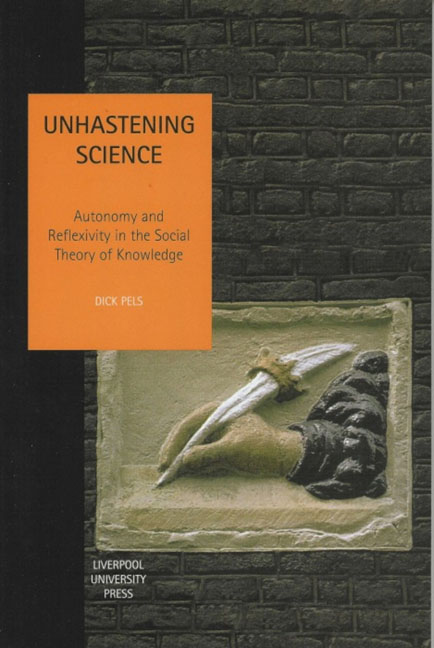Book contents
- Frontmatter
- Dedication
- Contents
- Acknowledgments
- 1 The Timescape of Science
- 2 What (Again) is So Special about Science?
- 3 Two Traditions in the Social Theory of Knowledge
- 4 The Natural Proximity of Facts and Values
- 5 Knowledge Politics and Anti-Politics: Bourdieu on Science and Intellectuals
- 6 The Politics of Symmetry
- 7 Reflexivity: One Step Up
- 8 Intellectual Autonomy and the Politics of Slow Motion
- Epilogue: Weak Social Theory
- Notes
- Bibliography
- Index
3 - Two Traditions in the Social Theory of Knowledge
- Frontmatter
- Dedication
- Contents
- Acknowledgments
- 1 The Timescape of Science
- 2 What (Again) is So Special about Science?
- 3 Two Traditions in the Social Theory of Knowledge
- 4 The Natural Proximity of Facts and Values
- 5 Knowledge Politics and Anti-Politics: Bourdieu on Science and Intellectuals
- 6 The Politics of Symmetry
- 7 Reflexivity: One Step Up
- 8 Intellectual Autonomy and the Politics of Slow Motion
- Epilogue: Weak Social Theory
- Notes
- Bibliography
- Index
Summary
Mannheim versus Wittgenstein
The preceding chapter has cleared a path for a more detailed inventory of the resources for developing a more pragmatically levelled and ‘earthly’ perspective on scientific rationality and objectivity. This chapter will sketch a field map of recent positions and divisions in the sociology of knowledge and science that have been influential in establishing such a disenchanted view. The next chapter will then enter into a sociological depth analysis of the fact/value distinction, which, like similar dualisms such as truth/power or knowledge/interest, has often acted as an epistemological placeholder and enforcer of a more ordinary and relative distinction between unhastened and institutionally secluded practices (such as science) and more hurried and gregarious ones (such as politics). The primary task of the present chapter is then to address the paradoxical fact that, while they have set fire to a whole range of other dualisms and dichotomies, science and technology studies (STS) have remained stuck in a significant residue of the dualism between fact and value. In order to account for this remarkable exceptionalism, we need to address the foreshortening of historical vision, within both STS and mainstream sociological theory, which has prompted both traditions in some way to reinvent the wheel (and to repeat some of the foundational flaws) of earlier contributions to the sociology of knowledge.
A first survey of the discursive field highlights the existence of a schism and mutual indifference between two currents of theorizing and research which I shall dub the ‘Mannheimian’ and the ‘Wittgensteinian’ traditions. This appellation is in somewhat ambiguous homage to David Bloor, who, in one of the first statements in print of the Edinburgh Strong Programme, compared the two thinkers with regard to the strategic possibility of a sociological explanation of logic, mathematics and natural science (Bloor 1973). The Mannheimian programme for the sociology of knowledge was considered ‘weak’ precisely for its refusal to explain cultural and natural science symmetrically and hence to extend causal sociological analysis to the hard case of the natural sciences; and for its coincident failure to demand an equally radical symmetry between the sociological explanation of true and false beliefs, thus confining the sociology of knowledge to a mere ‘sociology of error’.
- Type
- Chapter
- Information
- Unhastening ScienceAutonomy and Reflexivity in the Social theory of Knowledge, pp. 51 - 73Publisher: Liverpool University PressPrint publication year: 2003



